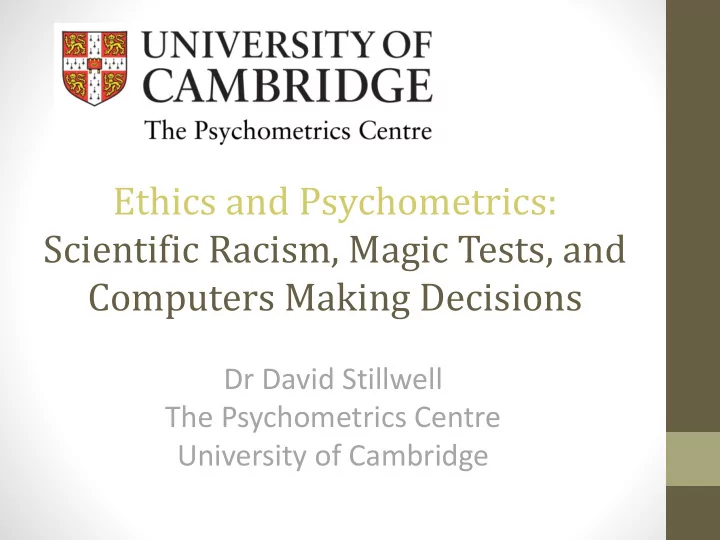

Ethics and Psychometrics: Scientific Racism, Magic Tests, and Computers Making Decisions Dr David Stillwell The Psychometrics Centre University of Cambridge
The first examinations Measuring candidates’ ability in order to determine their position in court. Xun Zi, 310BC -289BC 2
School examinations 1890 3
Scholastic Aptitude (11+, SAT) (1926-1950) 4
Meritocracy (1950- 1990) 5
‘Mental Age’ Binet , Paris, 1904 6
‘Mental Tests’ US Army Alpha, WW1 7
Herrnstein and Murray The Bell Curve (1994) 8
IQ testing Ellis Island 1912-1954 9
Ellis Island Test Results 10
Sterilisation, Race and IQ, USA 11
Scientific Racism (Racial Hygiene) • Virginia (1924) “Sterilization Act” for the " feebleminded” • Germany (1933) “Law for the Prevention of Genetically Diseased Offspring” (sterilization for feeblemindedness, mental illness, blindness, deafness, physical deformity) • Germany (1937) ‘Commission Number 3” compulsory sterilization of children of mixed-race origins. • Germany (1939) Euthanasia introduced in psychiatric hospitals for those with disabilities (broadly defined, this included homosexuality and “social deviancy”) • Soviet Union (1949), Incarceration on psychiatric diagnosis of “philosophical intoxication”, “sluggish 12 schizophrenia” (poor social adaptation), etc.
The Flynn Effect 13
The Flynn Effect: 50 years = 36 IQ points B= White in 1960; A = Black in 1960; but C = Black in 2010 14
Magic Tests 15
Magic Tests 16
Magic Tests • Personality tests give you an opportunity to describe yourself. They help you to tell the things you already know. • In most tests, each question measures one trait, e.g. “I avoid contact with others” and “I do not mind being the centre of attention” both measure Extroversion. • Your answers are compared to others who have taken the test (the norm group). Then your results are given in comparison to theirs. • If you take a test, you should really get feedback on your results. • It is acceptable for you to disagree with the feedback. • Some tests can be used for selection. Many popular tests should only be used for personal development (e.g. MBTI, Belbin Team Roles).
Two possible tomorrows for psychology Neuropsychology Computational social psychology 18
Your digital footprint • Demonstrates your habits, lifestyle & desires • Analysed psychometrically this can tell us: • What sort of person you are • Who are your friends • Your needs, hopes and expectations • What you are likely to do (or not do) • How? • Every keystroke you make is recorded • Algorithms identify patterns in these records • Your unique pattern creates a model of you • Your Avatar in cyberspace
How accurate did you say (2013)?
How accurate did you say (2015)?
How accurate did you say (201X)? Trait Big 5 Openness 0.77 Conscientiousness 0.68 Extraversion 0.71 Agreeableness 0.72 Neuroticism 0.58
Extraverts (High Extraversion)
Introverts (Low Extraversion)
Emotionally stable (Low Neuroticism)
Emotionally unstable (High Neuroticism)
The Psychometrician’s Dilemma • We can predict the psychological traits of billions of people in milliseconds. • What should it be used for? • …And under what conditions?
The Psychometrician’s Dilemma • A dating app already connects to users’ Facebook accounts and downloads their pictures so that users can decide whether they want to talk further to someone else based on their photos. • What if we use psychology to improve that matching, by measuring users’ personalities and then prioritising the best matches?
The Psychometrician’s Dilemma • A bank already analyses the e-mail correspondence of its employees to look for fraudsters. Employees are aware of this. It searches for keywords such as “steal” and then looks into more detail. • What if we use psychology to improve that targeting, by automatically measuring the personality of bank employees, to search for those high in narcissism or psychoticism?
The Psychometrician’s Dilemma • A graduate employer already does a web search for information on applicants. As part of this, a HR specialist might see a user’s social network account. • What if we use psychology to reduce the HR specialist’s bias and stereotypes, by automatically measuring the personality of job applicants, and recommending those with the best personality for the job?
The Psychometrician’s Dilemma • A social network already targets ads based on behaviour of its users on and off the network. For example, if you view a holiday website, then you’re more likely to see ads for flights. • What if we use psychology to improve that advertising, by showing extroverts ‘exciting’ holidays and introverts ‘relaxing’ holidays?
The Psychometrician’s Dilemma • A car insurance company prices its insurance partly on the basis of demographic characteristics such as age and geography • What if we use psychology to improve that pricing, by taking into account the personality of the buyer.
The Psychometrician’s Dilemma • A government provides national healthcare to its citizens. Costs could be drastically reduced if citizens did not engage in behaviour that’s associated with preventable diseases. • What if we use psychology to encourage healthy behaviour by identifying psychological risk factors for unhealthy behaviour, and then intervening; the earlier the better.
The Psychometrician’s Dilemma • A government already collects data on its citizens’ web habits, in order to search for terrorist behaviour • What if we use psychology to improve our understanding of terrorism, by automatically assessing who are the ‘influencers’ in a terrorist cell. • What if we use psychology to nudge at-risk people away from terrorism; the earlier the better?
The Psychometrician’s Dilemma • Do we want the computer to decide: • What you are sold? • How you are sold it? • The premium for your insurance or loan? • Who you date? • Whether you’re likely to engage in illegal behaviour? • Whether you require an intervention to stop your unhealthy habits? • Whether you require an intervention to stop your potential future terrorism?
Recommend
More recommend